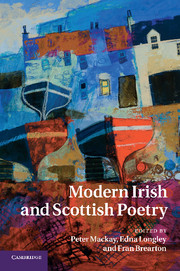Book contents
- Frontmatter
- Contents
- List of contributors
- Acknowledgements
- Introduction
- 1 Swordsmen: W. B. Yeats and Hugh MacDiarmid
- 2 Tradition and the individual editor: Professor Grierson, modernism and national poetics
- 3 Louis MacNeice among the islands
- 4 Townland, desert, cave: Irish and Scottish Second World War poetry
- 5 Affinities in time and space: reading the Gaelic poetry of Ireland and Scotland
- 6 Contemporary affinities
- 7 The Classics in modern Scottish and Irish poetry
- 8 Translating Beowulf: Edwin Morgan and Seamus Heaney
- 9 Reading in the gutters
- 10 ‘What matters is the yeast’: ‘foreignising’ Gaelic poetry
- 11 Outside English: Irish and Scottish poets in the East
- 12 Names for nameless things: the poetics of place names
- 13 Desire lines: mapping the city in contemporary Belfast and Glasgow poetry
- 14 ‘The ugly burds without wings’?: reactions to tradition since the 1960s
- 15 ‘And cannot say / and cannot say’: Richard Price, Randolph Healy and the dialogue of the deaf
- 16 On ‘The Friendship of Young Poets’: Douglas Dunn, Michael Longley and Derek Mahon
- 17 ‘No misprints in this work’: the poetic ‘translations’ of Medbh McGuckian and Frank Kuppner
- 18 Phoenix or dead crow? Irish and Scottish poetry magazines, 1945–2000
- 19 Outwith the Pale: Irish–Scottish studies as an act of translation
- Guide to further reading
- Index
- References
19 - Outwith the Pale: Irish–Scottish studies as an act of translation
Published online by Cambridge University Press: 18 April 2011
- Frontmatter
- Contents
- List of contributors
- Acknowledgements
- Introduction
- 1 Swordsmen: W. B. Yeats and Hugh MacDiarmid
- 2 Tradition and the individual editor: Professor Grierson, modernism and national poetics
- 3 Louis MacNeice among the islands
- 4 Townland, desert, cave: Irish and Scottish Second World War poetry
- 5 Affinities in time and space: reading the Gaelic poetry of Ireland and Scotland
- 6 Contemporary affinities
- 7 The Classics in modern Scottish and Irish poetry
- 8 Translating Beowulf: Edwin Morgan and Seamus Heaney
- 9 Reading in the gutters
- 10 ‘What matters is the yeast’: ‘foreignising’ Gaelic poetry
- 11 Outside English: Irish and Scottish poets in the East
- 12 Names for nameless things: the poetics of place names
- 13 Desire lines: mapping the city in contemporary Belfast and Glasgow poetry
- 14 ‘The ugly burds without wings’?: reactions to tradition since the 1960s
- 15 ‘And cannot say / and cannot say’: Richard Price, Randolph Healy and the dialogue of the deaf
- 16 On ‘The Friendship of Young Poets’: Douglas Dunn, Michael Longley and Derek Mahon
- 17 ‘No misprints in this work’: the poetic ‘translations’ of Medbh McGuckian and Frank Kuppner
- 18 Phoenix or dead crow? Irish and Scottish poetry magazines, 1945–2000
- 19 Outwith the Pale: Irish–Scottish studies as an act of translation
- Guide to further reading
- Index
- References
Summary
Do the stones, the sea, seem different in Irish?
Do we walk in language, in a garment pure
as water? Or as earth just as impure?
This chapter takes as its prompt two propositions. The first of these is from Edna Longley's ambition enunciated in a programmatic statement of intent in the Journal of Irish and Scottish Studies. There, she asserted that the aim of that volume was to provide ‘alternative narratives’ in which Irish and Scottish comparisons might complicate the traditional rubric of literary analysis. She made plain that ‘comparison is about difference, about distinctiveness as well as identity’. ‘Has Scottish or Irish exceptionalism been the enemy of Scottish or Irish particularism,’ she enquired, positing the possibility that ‘perhaps latterday identity politics and multiculturalism have actually re-inscribed habits of national segregation’. This opened up one anxiety about the capacity to conduct Irish–Scottish studies at all.
The second prompt came from Peter Mackay's article in the next issue of the same journal in which he traversed the contentious contours of the border between cultures. His exploration of the vexatious and controversial nature of literary translation provided a valuable metaphor for precisely the challenge that Longley had laid down. If Irish–Scottish studies is to be of value it must be capable of translating the experience of one culture into that of another and overcoming the national segregation against which Longley rails.
- Type
- Chapter
- Information
- Modern Irish and Scottish Poetry , pp. 313 - 327Publisher: Cambridge University PressPrint publication year: 2011

